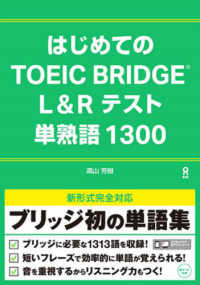- ホーム
- > 洋書
- > ドイツ書
- > Humanities, Arts & Music
- > History
- > regional history
Full Description
This book examines Argentine foreign policy under the military dictatorship from 1976-1983, also known as the National Reorganization Process. It brings together case studies on the most distinctive decisions and key issues in the regime's foreign relations, including the international response to human rights violations, the dispute with Chile over the Beagle Channel, covert operations in Central America, the Argentine nuclear program, and the Falklands War. Lisińska examines the influence of ideological factors on foreign policy decisions, highlighting the relationship between the nationalism shaping the military's policy goals and its pragmatic approach to achieving them.
Contents
1. Introduction.- 2. Ideological identification of the Argentine Armed Forces under the Military Rule.- 3. Mechanisms and determinants of Argentine Foreign Policy under the Military Rule.- 4. Diplomacy on the Multilateral Level: Human Rights and the Atomic Program.- 5. The Beagle Channel Territorial Dispute with Chile.- 6. Covert Military Operations: The Case of Central America.- 7. The Falklands Dispute and the Argentine-British War.- 8. Final Remarks: Ideologization of Argentine Foreign Policy under the Military Rule.








